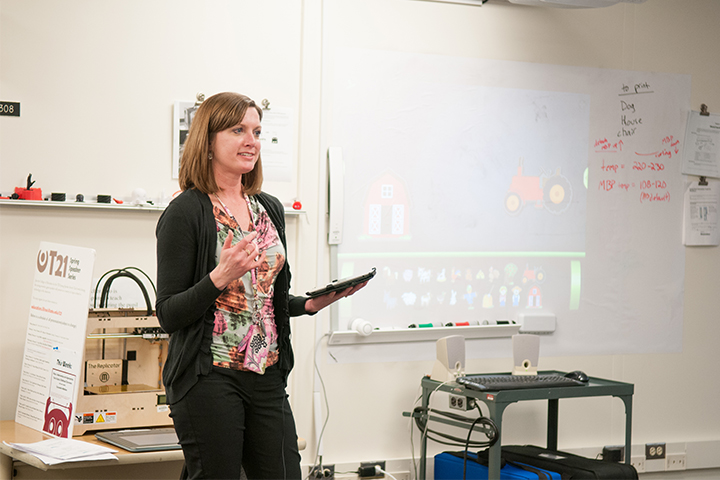Today, students are learning with the help of iPad applications that did not exist five years ago. But in order to effectively integrate educational technologies into their classrooms, educators must be knowledgeable and responsible digital citizens for their students.
The T21 Speaker Series is one way that the College of Education is helping its students, faculty, staff, and alumni keep pace with the skills necessary to serve 21st-century learners in an increasingly technologically-rich world. The series was supported by the generous donation of Bob English ’66, M.S. ’67, and Mary English ’68.
Speaker sessions took place throughout the spring semester and featured educational technology experts who work in pre-K–12 and higher education settings from within and outside the University.
Speaker topics included assistive technology for special education students, digital resume-building, and incorporating iPads into the curriculum.
“The presentations were a great opportunity for future educators because they allowed them to see how the technology that is all around them can be used effectively in their classrooms,” said Alex Fishel, assistant coordinator of educational technology for the College of Education.
Sessions took place in the college’s Exploratorium, located in a newly remodeled space in DeGarmo Hall. The space is equipped with three different types of interactive whiteboards, a 3-D printer, iMacs, iPads, Chromebooks, advanced recording devices, interactive dry-erase surfaces, and stations for collaboration. Staff members are available to help teacher candidates identify appropriate applications specific to their discipline.
“The T21 Speaker Series was created with the idea that the Exploratorium should not just be a computer lab or learning space, but an area where special events can be held as well,” Fishel said.
In this versatile environment, attendees didn’t just hear about the educational technologies; they could see them in action and try them out for themselves. This hands-on approach enabled them to continue advancing their new skills and knowledge on their own.
Junior elementary education major Carolyn Pincock was among the many students who attended multiple speaker sessions over the course of the semester. Pincock, who is a nontraditional student, said her confidence with technology grew with each experience.
“I used the familiarity I gained with one of the sites, and turned it into a learning tool to create a lesson plan for digital storytelling,” she said.
“I feel more comfortable with the technology available that can serve as supplements to the lessons in my classroom.”
The series’ first speaker was Bruce Franson ’77, M.S.E. ’90, Ed.D. ’96, a former high school teacher and a computer specialist in the College of Education dean’s office. His presentation focused on “enabling” technologies for visually impaired students. Speaking from the perspective of an individual with low vision, he said effective instruction starts with an educator’s knowledge and experience with these tools.
“Because of the nature of an individual’s visual impairment or personal preference, no single device is right for everyone,” said Franson.
As for traditional tools and strategies, such as braille, large print, and recordings, Franson stressed that the curriculum should marry the traditional with the cutting edge.
“Now, with the advent of the Internet, accessible e-books, and the proliferation of affordable computers, speech synthesizers, scanners, and cameras, visually impaired persons can access the printed word more directly, in new ways, and often without an intermediary,” Franson said. “These new technologies should be seen as additions to the ‘toolbox’ of alternatives rather than wholesale replacements for those tried and true technologies that have served us so well in the past”
Another of the series’ presenters, Cassandra Mattoon ’97, M.S. ’12, is a preschool teacher at Metcalf School, one of the University’s two laboratory schools.

Junior art education major Rachel Bein explores an iPad app with a preschool student from Metcalf School.
Mattoon took the audience through the learning process that helped her determine how to incorporate iPads into her curriculum.
After testing out several math, reading, science, and drawing applications with her nephew, and learning the applications’ “ins and outs,” she was ready to dive in.
“I can sit with an iPad for days and plan all these activities and lessons,” Mattoon said, “but I had to see (my students) using it before I could effectively begin planning.”
Mattoon learned how to be selective and to avoid “forcing” the technology into a lesson where it did not belong.
In the second hour of Mattoon’s session, she invited her preschool students into the Exploratorium. Each student was paired with an audience member, and together they played and learned on the iPad.
“I can present; I can give a PowerPoint; I can talk; but, that is really very limited,” Mattoon said. “They have to experience it—they have to be a part of it. That is truly the only way students are going to learn.”
Just like Mattoon, the teacher education students gained knowledge that only first-hand interactions could show them.
“It was beneficial to see that the kids knew just as much as we knew about the technology,” said Rachel Bein, a junior art education major. “They pick it up so quickly because they’re exposed to all the technology.”
Bein said she was able to observe how her preschool partner used “doodling” applications.
“That was good for me to see her interact with those kinds of apps because I know that they will be useful in my future classroom,” Bein said.
Moving forward, Fishel is optimistic that the speaker series will be brought back in the fall, so it can be paired with the T21’s annual technology conference, T21Con.
“We hope to continue to bring in high-quality presenters for our students and cover a broad range of topics related to technology in the classroom,” Fishel said.
Details for T21 initiatives and events can be found at Education.IllinoisState.edu/T21.



One thought on “College hosts educational technology speaker series”